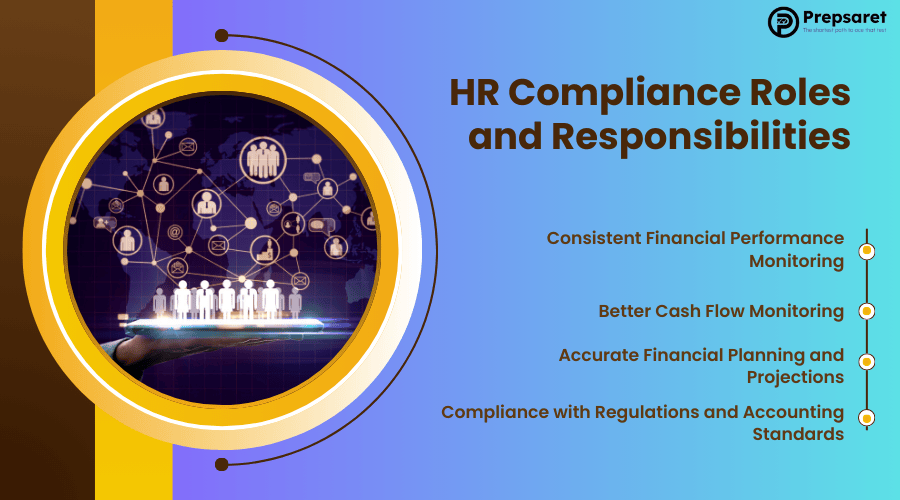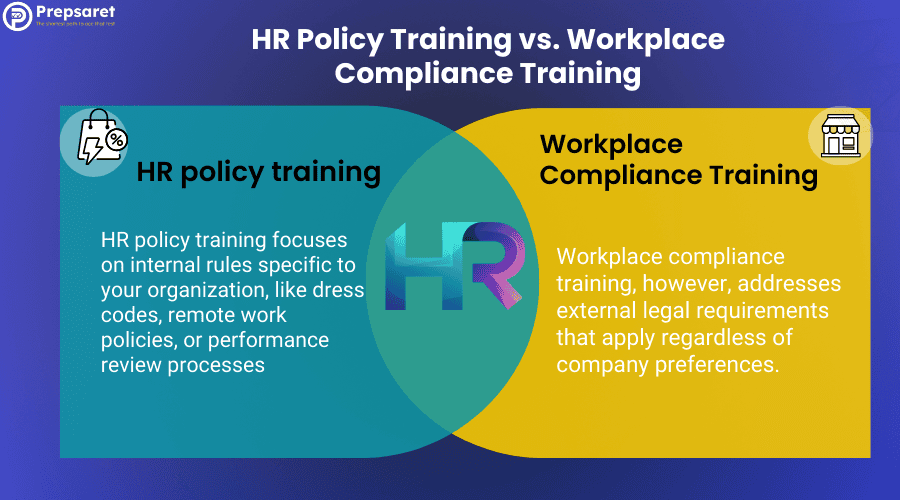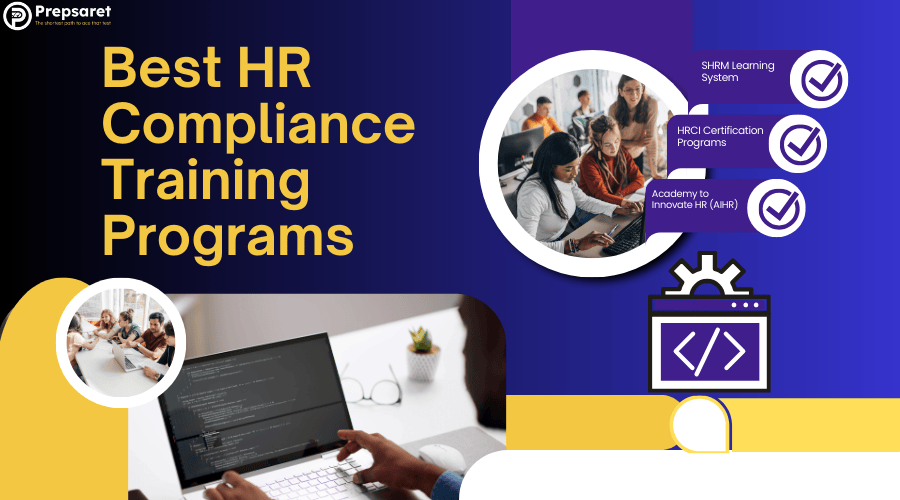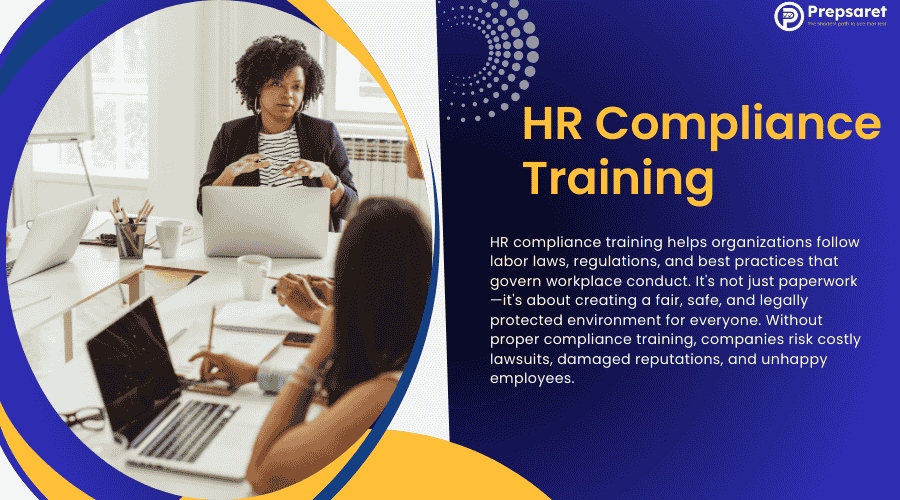Are you wondering how to keep your workplace legally sound while creating a positive environment for everyone? HR compliance training is your answer! This essential practice helps your team understand important laws, company policies, and workplace rules.
Not only does proper training reduce legal risks, but it also promotes a culture of respect and ethical behavior throughout your organization.
Ready to level up your HR knowledge? If you’re preparing for an HR certification that covers compliance topics, Prepsaret offers top-rated study materials, including practice exams and study notes for all SHRM and HRCI exams. Start your HR compliance journey with Prepsaret today.
What Is HR Compliance Training?
HR compliance training helps organizations follow labor laws, regulations, and best practices that govern workplace conduct. It’s not just paperwork—it’s about creating a fair, safe, and legally protected environment for everyone. Without proper compliance training, companies risk costly lawsuits, damaged reputations, and unhappy employees.
Effective HR compliance programs do more than just tick boxes. They build a foundation for a healthy workplace culture where employees understand their rights and responsibilities. When everyone knows the rules and why they matter, your organization operates more smoothly and ethically.
Online HR Compliance Training for Employees
While HR teams often lead compliance efforts, every employee plays a vital role in maintaining a compliant workplace. From entry-level workers to executives, everyone needs to understand how policies affect their day-to-day activities.
Employee compliance training helps prevent issues before they start. For example, when all team members understand harassment policies, they’re less likely to engage in inappropriate behavior and more likely to report problems they observe. This shared knowledge creates a workplace where everyone feels respected and protected.
HR Compliance Roles and Responsibilities

HR professionals serve as the backbone of compliance efforts across organizations. Their responsibilities include developing comprehensive training programs, managing ongoing compliance initiatives, and monitoring adherence to both internal policies and external regulations.
Successful compliance programs require collaboration across departments. HR teams work closely with legal counsel to interpret regulations, with IT teams to protect sensitive data, and with executives to secure buy-in for compliance initiatives. This cross-functional approach ensures that compliance becomes part of your company’s DNA rather than a separate function.
Key HR compliance responsibilities include:
- Creating and maintaining up-to-date policies
- Scheduling regular compliance audits
- Documenting training completion
- Investigating potential violations
- Staying current on changing regulations
- Adapting policies to accommodate new laws
Related post: HR professional development
Types of HR Compliance Training
Understanding the various types of compliance training helps organizations create comprehensive programs that address all legal and ethical requirements. Different positions and industries may require specialized training, but certain fundamentals apply across all workplaces.
HR Compliance Training Topics
A well-rounded compliance program covers several critical areas:
- Anti-harassment and discrimination: Teaching employees to recognize, prevent, and report inappropriate behavior
- Wage and hour laws: Ensuring proper classification, overtime pay, and break requirements
- Diversity and inclusion: Creating respectful workplaces that value differences
- Americans with Disabilities Act (ADA): Accommodating employees with disabilities
- Family Medical Leave Act (FMLA): Managing leave requests appropriately
- Workplace safety: Preventing injuries and responding to emergencies
- Data privacy: Protecting sensitive employee and customer information
While these topics form the foundation of most compliance HR Training programs, the specific content should be tailored to your industry and company size. For example, healthcare organizations need additional HIPAA training, while financial institutions require specialized security protocols.
HR Policy Training vs. Workplace Compliance Training

Though often used interchangeably, HR policy training and workplace compliance training serve different purposes. HR policy training focuses on internal rules specific to your organization, like dress codes, remote work policies, or performance review processes. Workplace compliance training, however, addresses external legal requirements that apply regardless of company preferences.
Regulatory changes frequently drive updates to internal policies. For instance, when new data privacy laws take effect, companies must update their information security policies and train employees on new protocols. Similarly, changes to state employment laws might require revisions to your workplace harassment policies.
Benefits of HR Compliance Training
Investing in comprehensive human resources compliance training delivers multiple advantages beyond simply avoiding legal problems:
- Reduced Legal and Financial Risk: Well-trained employees are less likely to engage in behaviors that lead to complaints, investigations, and lawsuits. The cost of prevention is always lower than the cost of litigation.
- Stronger Company Culture: When employees understand expectations and see consistent enforcement of policies, they develop greater trust in leadership and commitment to organizational values.
- Enhanced Strategic Capability: HR teams with strong compliance knowledge can provide more confident guidance to managers, helping them make decisions that balance business needs with legal requirements.
- Improved Reputation: Organizations known for ethical practices attract better talent, build stronger customer relationships, and develop more resilient brands.
- Increased Operational Efficiency: Clear policies and procedures create consistency across departments, reducing confusion and the need for case-by-case decisions.
HR Compliance Training Delivery Methods
How you deliver compliance training can significantly impact its effectiveness. The best approach often combines multiple methods to accommodate different learning styles and practical constraints.
Online HR Compliance Training
Virtual training programs have revolutionized how organizations approach compliance education. Online HR compliance training offers several advantages:
- Accessibility for remote and distributed teams
- Consistent messaging across all participants
- Self-paced options for busy professionals
- Automated tracking of completion rates
- Cost-effective delivery for large workforces
To maximize the impact of online compliance training, incorporate interactive elements like scenario-based questions, short videos, and knowledge checks. These features keep employees engaged and help them apply concepts to real-world situations they might encounter.
Free HR Compliance Training Resources
Not every organization has a large budget for compliance training, but that doesn’t mean you can’t create an effective program. Several government agencies and nonprofit organizations offer free HR compliance training online resources:
- The Equal Employment Opportunity Commission (EEOC) provides training materials on discrimination and harassment
- The Occupational Safety and Health Administration (OSHA) offers workplace safety guidelines and training
- Department of Labor websites feature resources on wage and hour compliance
- State workforce agencies often provide location-specific compliance materials
While free resources can provide a solid foundation, they typically lack customization and may not address industry-specific concerns. Consider supplementing these materials with company-specific examples and policies.
HR Compliance Training for Small Businesses
Small businesses face unique compliance challenges. With limited HR staff and resources, these organizations need efficient approaches that provide maximum protection with minimal overhead.
For small businesses, consider these streamlined compliance solutions:
- Develop a comprehensive employee handbook that addresses key legal requirements
- Include compliance basics in your onboarding process
- Schedule annual refresher training on critical topics
- Use free government resources as a starting point
- Consider shared training sessions with other local small businesses
Even with limited resources, small businesses can’t afford to ignore compliance requirements. The cost of a single lawsuit could be devastating for a small operation.
Related post: PHR vs. SHRM
How To Implement HR Compliance Training
Creating an effective compliance program requires careful planning and execution. Follow these steps to implement HR compliance training online that works:
- Assess your needs: Identify regulatory requirements for your industry and location
- Define clear objectives: Determine what employees should know and do after training
- Choose appropriate content: Select or develop materials that address your specific needs
- Assign training: Determine who needs which training modules
- Track completion: Document participation and understanding
- Evaluate effectiveness: Measure knowledge retention and behavior changes
- Update regularly: Refresh content as regulations change
The right tools make implementation much smoother. Consider investing in a learning management system (LMS) that integrates with your HRIS platform. These systems automate assignments, track completion, and generate compliance reports that prove your due diligence.
HR Compliance Training Checklist
Use this checklist to ensure your compliance program covers all the essentials:
- Harassment prevention training
- Discrimination awareness
- Wage and hour compliance
- Safety procedures
- Data privacy and security
- Ethics and code of conduct
- Industry-specific regulations
- Documentation processes
- Reporting procedures
- Consequences for violations
- Resources for questions
- Regular refresh schedule
This checklist provides a starting point that you can customize based on your organization’s specific needs and regulatory environment.
HR Compliance Certification and Professional Development
For HR professionals who want to specialize in compliance, several certification programs provide formal recognition of expertise. These credentials demonstrate your commitment to maintaining legal and ethical workplaces.
Popular HR certifications with strong compliance components include:
- SHRM Certified Professional (SHRM-CP)
- SHRM Senior Certified Professional (SHRM-SCP)
- Professional in Human Resources (PHR)
- Senior Professional in Human Resources (SPHR)
- Global Professional in Human Resources (GPHR)
Beyond enhancing your credibility, compliance certification opens doors to specialized career paths such as:
- HR Compliance Officer
- Employee Relations Specialist
- HR Business Partner
- Risk Management Director
- HR Director or VP
These roles often command higher salaries due to their critical importance in preventing legal issues and protecting organizational reputation.
Best HR Compliance Training Programs

When selecting external compliance training programs, consider these top providers:
- SHRM Learning System: Comprehensive materials covering all aspects of HR compliance within their certification preparation materials
- HRCI Certification Programs: Detailed compliance content integrated into their various certification tracks
- Academy to Innovate HR (AIHR): Specialized compliance modules with modern, interactive approaches
- Government-Backed Programs: Industry-specific compliance training from agencies like the EEOC and OSHA
When evaluating programs, look for:
- Accreditation by recognized organizations
- Comprehensive, up-to-date content
- Options for recertification
- Interactive learning components
- Industry-specific examples
- Practical job aids and tools
How Prepsaret Can Help You Prepare for HR Compliance Certification
Prepsaret offers specialized study materials designed specifically for HR professionals seeking compliance-focused certifications. Their resources include:
- Comprehensive HRCI and SHRM practice exams: for SHRM-CP, SHRM-SCP, GPHR, PHR, and SPHR with detailed answer explanations that help you understand not just the correct answer but why other options are incorrect
- Concise study notes: covering all exam content areas with 5 practice quizzes at the end of each lesson
- Real-world scenarios: that prepare you for both the exam and actual workplace situations
- Mobile-friendly resources: for studying anywhere, anytime
Prepsaret’s materials are developed by experienced HR professionals who understand the challenges of compliance management. Their practice questions reflect the types of situations you’ll encounter both on the exam and in your daily work.
FAQs About HR Compliance Training
What Is the Role of HR in Compliance?
HR develops, implements, and monitors compliance programs, ensuring all employees understand their responsibilities. They serve as advisors to leadership, trainers for staff, and investigators when issues arise
How To Get a Job in HR Compliance?
Start with HR education, earn relevant certifications like SHRM-CP or PHR, and gain experience in general HR roles. Develop specialized knowledge in employment law and build strong analytical and communication skills.
Can I Get a Job in HR With No Experience?
Yes! Entry-level positions like HR assistant or coordinator provide foundations for growth. Volunteering, internships, and certifications can help overcome the experience gap when changing careers.
Does HR Pay Well?
HR salaries vary widely but typically offer competitive compensation. Specialized roles in compliance, total rewards, and HR management command higher salaries, often ranging from $70,000 to $150,000+ annually.
What Is an Entry-Level HR Position?
HR assistants, coordinators, and administrators typically serve as entry points. These roles handle administrative tasks, basic employee questions, and support for more complex HR functions.
How To Obtain a PHR?
Earn your PHR by meeting education/experience requirements, studying with quality materials like Prepsaret, applying to HRCI, passing the exam, and maintaining certification through continuing education credits.
Can You Work in HR Without an HR Degree?
Absolutely! Many successful HR professionals have degrees in business, psychology, communications, or other fields. Certifications and practical experience often matter more than your specific degree.
What Are the Highest Paying Compliance Jobs?
Chief Compliance Officers, HR Directors with compliance specialization, and Employment Attorneys typically earn the highest salaries, often exceeding $150,000 in large organizations and competitive markets.
Start Your HR Compliance Training Journey Today!
HR compliance training isn’t just about avoiding penalties—it’s about building a stronger, safer, and more ethical workplace. Whether you’re an HR professional, small business owner, or aspiring compliance leader, the right training sets the foundation for success.
Get certified with help from Prepsaret’s industry-leading study tools—from practice exams to comprehensive study notes for SHRM and HRCI certifications. Start preparing today and protect your organization with confidence!

